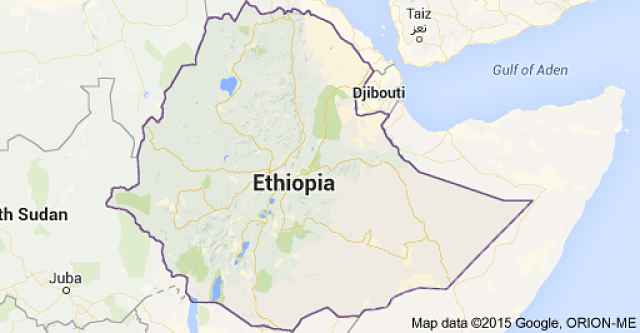 Number of Ethiopians needing food aid surges to 4.5 million after failed rains. (Ethiopia Google Map)
Number of Ethiopians needing food aid surges to 4.5 million after failed rains. (Ethiopia Google Map)
By Aaron Maasho
ADDIS ABABA — The number of Ethiopians who will need food aid by the end of this year has surged by more than 1.5 million from earlier estimates due to failed rains, United Nations agencies said on Monday.
Ethiopia needs an extra $230 million from donors to secure aid for a total of 4.5 million people now projected to require assistance this year, the Office for the Coordination of Humanitarian Affairs (UNOCHA), the World Food Programme (WFP) and the U.N. children’s agency UNICEF said in a statement.
The country of 96 million people is one of Africa’s fastest-growing economies, but failed rains have devastating consequences for food supplies.
“The belg rains were much worse than the National Meteorology Agency predicted at the beginning of the year. Food insecurity increased and malnutrition rose as a result,” said David Del Conte, UNOCHA’s acting head of office in Ethiopia, referring to the short, seasonal rainy season that stretched from February to April.
Areas normally producing surplus food in the Horn of Africa country’s central Oromia region were also affected by shortages, the statement said, adding lack of water had decreased livestock production and caused livestock deaths in other pastoralist areas.
Meteorologists have warned that the El Nino weather phenomenon, marked by a warming of sea-surface temperatures in the Pacific Ocean, is now well established and continues to strengthen. Models indicate that sea-surface temperature anomalies in the central Pacific Ocean are set to climb to the highest in 19 years.
The El Nino can lead to scorching weather across Asia and east Africa but heavy rains and floods in South America.
The United Nations cautioned that the anomaly could further affect Ethiopia’s “kiremt” rains that stretch from June to September.
“A failed belg followed by a poor kiremt season means that challenges could continue into next year,” said John Aylieff, WFP’s Ethiopia representative.
—
Related:
The Cause of Ethiopia’s Recurrent Famine Is Not Drought, It Is Authoritarianism (Huffington Post)
Join the conversation on Twitter and Facebook.

























